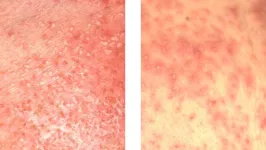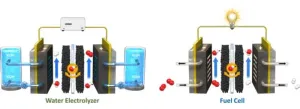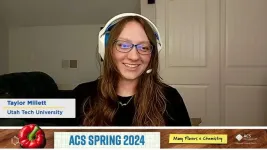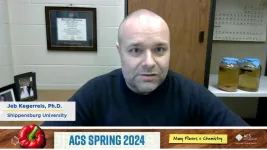(Press-News.org) Research from the University of Southampton has identified common issues women face when experiencing periods while homeless.
A review of research published in Women and Health has found homeless women experienced practical challenges in managing menstruation alongside feelings of embarrassment and shame, with many ‘making do’ due to inadequate provision.
The researchers say it’s high time to address the provision of menstrual health resources as a basic human right.
Dr Stephanie Barker, a teaching fellow at the University of Southampton who co-led the review said: “So-called ‘period poverty’ is a global concern. Our findings highlight the need to stop gatekeeping and limiting access to menstrual health products. This is both a public health issue and a human rights one.”
The review of research evidence is the first to explore homeless women’s experiences of menstruation. The University of Southampton team identified and analysed nine studies on the topic conducted in the United Kingdom, the United States, Canada and Nepal. Three key themes emerged from the research.
The first is challenges in the logistics of managing menstruation while homeless. Finding a clean, private space to use and change menstrual products was a common issue. The few options available, such as public toilets, were described as unsanitary and not fit for purpose. The stigma attached to homelessness means women are often turned away from public and privately owned bathroom facilities.
Dr Polly Hardy-Johnson, also a teaching fellow at the University of Southampton and co-lead author on the paper, added: “Even as paying customers, women were subject to stigma around assumed drug use, limiting their access to bathrooms. Being able to pass as ‘not homeless’ was more difficult when women were unable to maintain menstrual health.
“Limited access to facilities led to infections and increased the need for costly laundry services, due to leakages and blood-stained clothing. There is a need for private, safe and clean locations for managing menstruation, as well as access to laundry facilities.”
Rough sleepers relied on service providers for menstrual products, but several studies noted that provision fell short and was sporadic. This meant women would sometimes forgo food to buy menstrual products or shoplift them.
The second theme was around feelings of embarrassment, shame and dignity linked to maintaining menstrual health. Women felt the need to hide that they were menstruating and felt judged when they could not maintain menstrual health, causing anxiety and discomfort.
Women reported services rationing free menstrual supplies, forcing them to have to ask staff (sometimes men) multiple times per day for tampons, sanitary pads, and other products.
The third theme was around women ‘making do’ to manage the challenges they were facing. Several women reported using sponges, clothes, and cut-up t-shirts as reusable ways of soaking up menstrual blood and avoiding leaks. Others used layered wads of toilet paper, and some reused soiled disposable menstrual products. To treat infections some women turned to cheap herbal remedies rather than more expensive treatments.
Studies also looked at what services the women found useful. The provision of menstrual health products and birth control products was useful, alongside sexual health services. Warm, welcoming cafes and day centres helped to soothe period pain and discomfort.
Shared information within the homeless community about the support available, showering facilities and the sharing of products helped to improve menstrual health management.
The research team found there is a lack of evidence on the experiences of homeless people who do not identify as women and who menstruate. To address this, the team has received £9.9K in funding from British Academy/Leverhulme Small Research Grants to better understand the menstruation needs of all people experiencing homelessness.
The project will conduct in-depth interviews and use creative ways to amplify marginalised voices, and co-create a policy brief with the homeless community and key stakeholders on improving access to menstrual healthcare.
The homeless period: a qualitative evidence synthesis is published in Women and Health and is available online.
Ends
Contact
Steve Williams, Media Manager, University of Southampton, press@soton.ac.uk or 023 8059 3212.
Notes for editors
The homeless period: a qualitative evidence synthesis is published in Women and Health and is available at: https://www.tandfonline.com/doi/full/10.1080/03630242.2024.2310716
For Interviews with Dr Stephanie Barker and Dr Polly Hardy-Johnson please contact Steve Williams, Media Manager, University of Southampton press@soton.ac.uk or 023 8059 3212.
Additional information
The University of Southampton drives original thinking, turns knowledge into action and impact, and creates solutions to the world’s challenges. We are among the top 100 institutions globally (QS World University Rankings 2023). Our academics are leaders in their fields, forging links with high-profile international businesses and organisations, and inspiring a 22,000-strong community of exceptional students, from over 135 countries worldwide. Through our high-quality education, the University helps students on a journey of discovery to realise their potential and join our global network of over 200,000 alumni. www.southampton.ac.uk
www.southampton.ac.uk/news/contact-press-team.page
Follow us on X: https://twitter.com/UoSMedia
END
Study explores homeless women’s experiences of ‘period poverty’
2024-03-18
ELSE PRESS RELEASES FROM THIS DATE:
Keeping score: novel method might help differentiate 2 serious skin diseases
2024-03-18
Your skin becomes red and spots filled with pus appear, so you visit a dermatologist. When these symptoms spread to the skin throughout the body, it is difficult for the physician to distinguish whether it is generalized pustular psoriasis (GPP) or acute generalized exanthematous pustulosis (AGEP), as both have similar symptoms. The two diseases run different courses and require different treatments. Without proper treatment, the symptoms can worsen severely and cause complications, so it is essential to distinguish between them.
Researchers ...
Developing bifunctional catalyst performance enhancement technology that will dramatically lower the cost of hydrogen production
2024-03-18
Dr. Hyung-Suk Oh and Dr. Woong-Hee Lee of the Clean Energy Research Center at the Korea Institute of Science and Technology (KIST), in collaboration with POSTECH and Yonsei University, have developed a methodology to improve the reversibility and durability of electrodes using bifunctional platinum-nickel alloy catalysts with an octahedral structure that exhibits both oxygen reduction and generation reactions.
Bifunctional catalysts are a new generation of catalysts that simultaneously produce hydrogen and oxygen from water using a single catalyst. Currently, electrochemical systems such as water electrolysis technology and CCU (carbon dioxide ...
Animal hair structure changes from summer to winter to fend off freezing weather
2024-03-17
NEW ORLEANS, March 17, 2024 — Unique adaptations allow wild animals to survive temperature extremes that would quickly kill an unprotected human. For example, certain animals can withstand bitterly cold weather, thanks to the insulating properties of the hollow hairs that make up their coats. Little has been known about the hairs, but now, researchers have discovered that their inner structure changes with the seasons.
The researchers will present their results today at the spring meeting of the American Chemical Society (ACS). ACS Spring 2024 is a hybrid meeting being held virtually and in person March ...
The many flavors of edible ants
2024-03-17
NEW ORLEANS, March 17, 2024 — Insects are typically unwelcome visitors to a picnic, but they could be a flavorful, nutritious and sustainable addition to the menu. Eating insects is common in some parts of the world, and some species are even considered delicacies. Ants are one example, sometimes roasted whole for a snack or ground and used to add flavor and texture to dishes. Researchers now report the unique aroma profiles of four species of edible ants, which taste markedly different from one another.
The researchers will present their results today at the spring meeting of the American Chemical Society (ACS). ACS Spring 2024 is a hybrid meeting being held ...
Better kombucha brewing through chemistry
2024-03-17
NEW ORLEANS, March 17, 2024 — Kombucha is a fermented tea known for its health benefits and tangy kick. But brewers can find it challenging to keep kombucha’s alcohol levels low because the bacteria and yeast used in the fermentation process vary from batch to batch. Now, chemists from Shippensburg University are investigating ways to reliably minimize alcohol, tailor taste profiles and speed up the kombucha fermentation process to help home and commercial producers optimize their funky brews.
The ...
Very low calorie diets are safe and acceptable for teenagers with moderate to severe obesity when used short-term and supported by a dietitian, Australian study finds
2024-03-16
*This is an early press release from the European Congress on Obesity (ECO 2024) Venice 12-15 May. Please credit the Congress if using this material*
Short-term very low calorie diets are safe for teenagers living with moderate to severe obesity when closely monitored by an experienced dietitian, new research to be presented at the European Congress on Obesity (ECO 2024), has found.
In addition, many of the adolescents who took part in the Australian study found a very low calorie diet to be an acceptable way to lose weight, despite experiencing side-effects.
Very low energy diets (VLED) typically involve taking in ≤ 800 calories per day and include meal replacements ...
Mount Sinai experts to present new research at 71th Annual Meeting of the Society for Reproductive Investigation
2024-03-16
Reproductive health experts from the Women’s Biomedical Research Institute at the Icahn School of Medicine at Mount Sinai will present research at the 71th Annual Scientific Meeting of the Society for Reproductive Investigation (SRI) in Vancouver, Canada from March 12-16. The doctors and researchers are available for interview about their findings; they can also provide commentary on other women’s health and female biology topics, breaking news, and studies.
PRESENTATIONS and POSTER SESSIONS
(*All abstracts are under embargo until the below listed times*)
Friday, March 15, 2024
9:00 -11:00 a.m. PT (12:00-2:00 ...
Less is more: Not placing a drain improves distal pancreatectomy outcomes
2024-03-16
Research led by Amsterdam UMC across ten Dutch hospitals and two Italian hospitals has found that not placing a drain during surgery improves outcomes in patients undergoing a left-sided pancreatic resection, also known as ‘distal pancreatectomy’. The study, today published in Lancet Gastroenterology & Hepatology, set out to confirm the safety of drainless surgery, as compared to the current routine practice of leaving a surgical drain. Ultimately, the study not only confirmed the safety of ‘drainless ...
UC study: Subcutaneous infusion pump safe, effective for Parkinson’s treatment
2024-03-16
An international, multisite phase 3 trial co-led by a University of Cincinnati researcher found Parkinson’s disease medication delivered through an infusion pump is safe and effective at reducing symptoms for longer periods of time.
These results, published March 15 in the Lancet Neurology journal, could lead to additional treatment options for patients with the condition.
Parkinson’s symptoms such as tremors, slowness and stiffness are caused by low levels of dopamine in the body. For decades, doctors ...
Oregon State researchers take deep dive into how much water is stored in snow
2024-03-15
CORVALLIS, Ore. – A heavy snowpack is fun for skiers and sledders, and it also acts like an open-air storage tank that melts away to provide water for drinking, irrigation and other purposes during dry months.
But exactly how much water is held in snowpacks, and for how long?
That information, critical to water managers around the globe, has taken on new clarity thanks to a new, more holistic calculation technique developed by researchers in the Oregon State University College of Engineering.
“Water managers tend to consider a portfolio of infrastructure options – surface water reservoirs, groundwater ...






